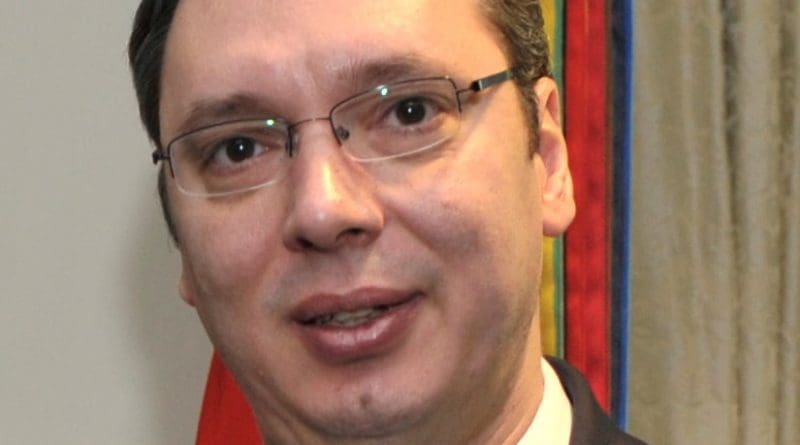Serbia: PM Vucic Accuses Kosovo Of Planning Attack On Train
By Die Morina and BIRN team
Following an emergency session of Serbia’s Council for National Security, Serbian Prime Minister Aleksander Vucic on Saturday accused Kosovo of sending special forces to attack the first train in 18 years from Belgrade to the northern, Serb-run part of the Kosovo town of Mitrovica.
“They sent a unit … compromised only of the most loyal Albanians with rifles to Jarinje [the border crossing] where they were to arrest the train driver and passengers,” he said, adding that the overall aim was to cause “a great conflict”.
“The [Kosovo] Albanians, without the approval of NATO or anyone else, sent 17 armoured vehicles with special units … to the north with the aim of provoking a conflict of broad proportions,” Vucic claimed.
Vucic ordered the train stopped at the Serbian border town of Raska claiming that Kosovo’s Albanians had tried to mine the railway.
Kosovo police strongly denied such accusations and said they had checked the railway and found no explosives.
The Serbian Prime Minister also sent “an unambiguous warning” to Kosovo “not to try to attack the Serbian people in Kosovo with arms, because Serbia will not allow such attacks.
“Peace is in everyone’s interest, they should not play and destroy what we have long been building. A train with just passengers is not a threat to anyone … I am not threatening anyone, I am just begging them not to kill Serbs because we will protect our people,” Vucic said.
Vucic said Kosovo – which declared independence from Serbia in 2008 – had been preparing “war games” for some time, adding he was not sure if they “had anyone’s blessing” – presumably meaning outside powers.
The train in question, painted in the colours of the Serbian flag and bearing the words “Kosovo is Serbian” in 21 different languages, including Albanian, set off from Belgrade to northern, Serb-run Mitrovica on Saturday morning – the first train from Belgrade to Mitrovica in 18 years.
The announced reopening of the line from Serbia to Mitrovica – as well as the decorations on the train – raised tensions in Kosovo, where officials deemed it as a provocation and called for it not to enter Kosovo.
In the event, the train did not enter Kosovo. Vucic said that he decided to stop the train in Raska, in southern Serbia, just before the border, “to save freedom and lives and avoid conflict and show everyone we want peace”.
He added that he already discussed the situation with the EU foreign policy chief, Frederica Mogherini, and would inform Russia, China and and US Vice President Joseph Biden about the “war games that Pristina was preparing.”
Kosovo Prime Minister Isa Mustafa meanwhile told reporters in Pristina that Kosovo had mobilized state institutions to deal with the situation but did not refer to special police actions.
“I think the reversal of this train is the right action because its entry would not be allowed,” he said.
“If it entered the country, this train would be treated by the laws of Kosovo. The Republic of Kosovo will not allow such provocations which would turn Kosovo and the region towards a dark and unpredictable conflict.”
Media reports confirmed that all the passengers left the train in Raska, just before the border, after it stood in the station for more than an hour-and-a-half. The passengers continued their journey to Mitrovica by bus.
The interior of a train is decorated with posters of Serbian saints and Serbian Orthodox Church monasteries in Kosovo, with explanations of the pictures in both Serbian and English. Serbian authorities said the aim was to promote Serbian heritage in Kosovo.
Hashim Thaci, the President of Kosovo, on Saturday said Kosovo “respects free movement of people and goods. But the entry of a train covered in nationalist posters from Serbia, which are contrary to the constitution and laws of Kosovo, is totally unacceptable.
“Furthermore, there are passengers and high officials of Serbia on the train who do not have permission to enter Kosovo,” Thaci added, calling on the authorities to ban the train from entering the country.
Edita Tahiri, Kosovo’s Minister for Dialogue, called on the EU to intervene and halt “the provocation of this train with its ultra-nationalist symbols, in the name of keeping the peace, stability and the principles of dialogue”.
However, Maja Kocijancic, EU spokesperson for Foreign Affairs and Security, said issues between Belgrade and Pristina must be resolved through dialogue.
The US ambassador to Kosovo, Greg Delawie, wrote on Twitter that he was “concerned about train issue.”
“Call for restraint from all parties. Need normalization not confrontation,” Delawie wrote.
The Belgrade authorities previously said the test line would operate between January 20 and February 26, after which the authorities would decide if the line is profitable.

